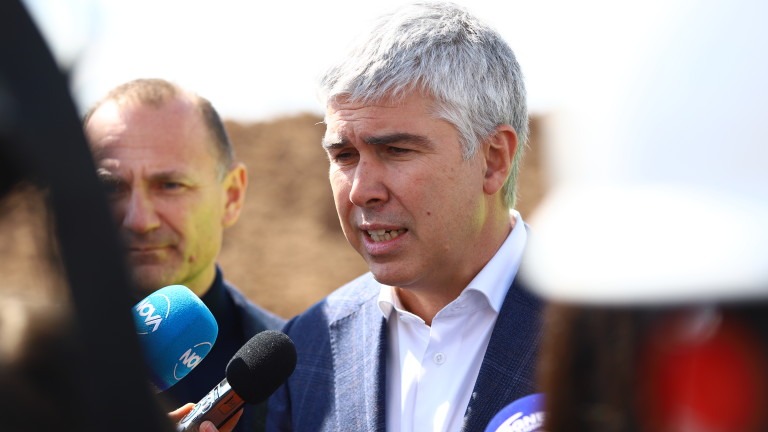Bulgaria’s Energy Minister Malinov: A rising star with dubious plans
Vladimir Malinov, Bulgaria’s energy minister, is emerging as a key player in the government with ambitions far beyond those of a caretaker minister. He is likely to retain his position in a potential GERB-DPS government and enjoys the confidence of the Radev-Borisov-Peevski trio. Mr Malinov has a long history of cooperation: he was the main Bulgarian point of contact for the Turk Stream project under former Prime Minister Borissov, and was the driving force behind the Botas-Bulgargaz deal with President Radev, a deal cemented by a tripartite protocol involving Mr Malinov himself. He is also seen as a beacon of hope by Delyan Peevski, a prominent figure in Bulgaria’s unelected ‘deep state’. Malinov’s influence could be further enhanced if he convinces the US to prioritise business opportunities for American companies in the energy sector in exchange for removing Peevski from the Magnitsky Act sanctions list.
Malinov’s US charm offensive
Malinov’s current charm offensive in the US hinges on the expansion of Bulgaria’s gas transmission capacity, ostensibly to facilitate future US LNG imports. However, this claim is at best a gross exaggeration with dubious motives. He further sweetened the deal by dangling potential business opportunities for US energy companies in upgrading the Chaira electricity pumping station and building new electricity storage capacity. In addition, he is touting the new unit at the Kozloduy NPP as a done deal with the US, despite the complete absence of any proper market analysis, feasibility study or design work. In essence, Mr Malinov has embarked on a campaign of transactional energy diplomacy that goes far beyond the normal remit of an interim cabinet minister.
If you like this article, please support us with a donation to PayPal and to the direct account of the association Alternatives and Analyses IBAN BG58UBBS80021090022940. This will ensure that there will be further analyses
While independent verification of news about Mr Malinov’s US meetings and discussions remains elusive (most news comes from his own office), the PR narrative is clear: Mr Malinov is no longer Gazprom’s puppet master in Sofia and now enjoys the trust of key US administration officials. His most valuable bargaining chip is the crucial role of the Bulgarian segment of the Vertical Gas Corridor (VGC), which promises an additional 17 bcm/year of transit capacity via the reverse flow of the Trans-Balkan pipeline.However, some energy experts in Washington remain sceptical.Concerns remain that the expanded VGC capacity won’t be reserved exclusively for non-Russian gas for purely market-driven reasons.The dominance of Russian gas in the region makes LNG imports less attractive, as evidenced by the low volumes of LNG arriving through Turkish and Greek terminals in the past three months and the delays plaguing the Alexandroupolis terminal project.
Mr Malinov’s tactics mirror the Turk Stream playbook
Mr Malinov’s strategy for the Vertical Gas Corridor (VGC) is similar to the approach used to promote the Turk Stream pipeline. He emphasises meticulous compliance with European regulations, but ultimately Russian gas wins out in the Turk Stream “capacity tenders”.Russian gas is a tool, not a commodity.Gazprom’s prices are not market-driven but politically motivated.The Russian government, Gazprom’s main shareholder, sets prices to secure dominant market shares and an alternative supply route after Ukraine’s transit is cut off.Putin can easily undercut competitors by lowering the price well below market value.The higher market price of LNG makes it unattractive for traders supplying destinations such as Hungary, Slovakia, Serbia, Austria, Romania and Greece. These players naturally seek the much cheaper piped gas from Russia, either directly or indirectly via Turkey.
Mr Malinov: a master of illusionary promises
Mr Malinov excels at creating convincing images and promising unrealistic results, especially for politicians and diplomats looking for quick fixes.
However, the end result – his vision of the VGC as the region’s leading strategic project – risks replicating Turk Stream’s net gas balance, which benefits only Russia.
Once the VGC expansion is completed, any complaints from diplomats or politicians are likely to come too late.The project will be a fait accompli, and Mr Malinov’s main consolation will be that the capacity for non-Russian gas is there, traders aren’t buying it because it’s not competitive.
The changing geopolitical landscape
These grand designs, laden with underlying geopolitical agendas, seem to ignore the dominant role of the Ukrainian war and the escalating EU-Russia confrontation. Both factors significantly reduce the tolerance for duplicity.
In addition, a growing number of arbitration cases against Gazprom are being decided in favour of EU companies.These rulings award billions in compensation for undelivered Russian gas following the outbreak of the war in Ukraine. A recent EU court ruling even includes an order to redirect payments for Russian gas to the accounts of EU energy companies, effectively blocking Russian court-imposed limits on compensation.With more similar rulings expected, Gazprom’s ability to operate its accounts could be compromised, potentially jeopardising future sales of Russian gas in the EU.




